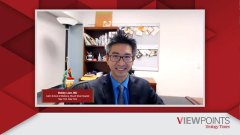
TITAN and ARCHES Trials in mCSPC
Ashley E. Ross, MD, PhD, reviews data and study results from the phase 3 TITAN and phase 3 ARCHES trial in mCSPC.
Episodes in this series

Neal Shore, MD, FACS: Let’s transition to Ashley. We’ve given you the responsibility to concisely review TITAN and ARCHES, and how that’s given us the level 1 evidence for combining ADT [androgen deprivation therapy] with apalutamide as well as with enzalutamide. If you could review those 2 trials, that would be great.
Ashley E. Ross, MD, PhD: Just to reiterate to the urologists on the call, we were often the ones making the initial diagnosis of metastatic disease. As Vivek said, it’s important to tell the patient that it’s going to be multimodal therapy up front. It’s going to be androgen deprivation therapy plus something else. We mentioned the trials that you just went through. Now we have the TITAN and ARCHES trials. Both are using androgen receptor [AR] inhibitors. Both inhibitors—TITAN, apalutamide; ARCHES, enzalutamide—have a trimodal action with a blocking receptor, blocking their entry into the nucleus, and blocking the transcription of androgen-derived genes.
These were both nice designs. They’re phase 3 trials. I’ll start with the TITAN trial, which used apalutamide. It was meant to capture all-comers. It was randomizing them to androgen deprivation therapy or androgen deprivation therapy plus apalutamide. They had coprimary end points of overall survival and metastasis-free survival. It included patients with low-volume and high-volume disease and those who were previously treated with docetaxel as well, although they were in the minority. Essentially, it showed an overall survival benefit. There was some thought early on that if you would treat with this drug, and you’d improve the first progression-free survival. You’d improve metastasis-free survival for new metastases, but then the patient would develop highly resistant disease very quickly. That did not seem to be the case. More therapy up front attacking those previous early resistant clones or already existing resistant clones was better for the patients. It improved their overall survival, and it did that without decreasing the quality of life of the patients. The combined therapy did not fit quality of life. In fact, as you look down the road for those trials, you see that if anything, they trend better for the people on the combination therapy because they’re avoiding cytotoxic chemotherapy and getting less fractures.
It was a well-tolerated drug for apalutamide, and it has just reported that it has a longer-term outcome. There are no new treatment adverse effects. ARCHES is a trial in a similar setting using enzalutamide. ARCHES, originally, reported out for progression-free survival. It allowed people to have previous docetaxel, although most men did not have that. And it showed a radiographic progression-free survival benefit for adding on enzalutamide to androgen deprivation–resilient patients alone. At the last ESMO [European Society for Medical Oncology Annual Meeting], they first showed their overall survival outcomes, and they saw an overall survival benefit as well. Hazard ratio was about 0.66% for overall survival. If we add on these androgen receptor inhibitors to androgen deprivation therapy, you’re improving overall survival.
Neil, as you and David mentioned, you don’t see this stratification—high volume, low volume—when you look at the forest plots and all the different categories. No matter what disease state you were—low volume or high volume—the low volume is where the controversy is. Those guys are benefiting from multimodal approach up front. It makes that decision easier to save a person with low-volume disease. I still should be intensifying therapy in most cases. We’ll talk about it later. With the TITAN trial, there are some real-world data. Even though it’s already a couple of years old or so, the data for abiraterone is even older, but the utilization is just starting to go about 50% in the community. It’s an important message. These trials were powerful. It shows that combination therapy improves overall survival outcome.
Neal Shore, MD, FACS: I’m going to transition in a second to Bobby Liaw to review ENZAMET and talk about the ARASENS trial, which is important because it starts to make us think about triplet therapy. Ashe and Bobby have clearly reviewed, very concisely and clearly, that combination therapy delays progression, delays time to CRPC [castration-resistant prostate cancer], delays time to subsequent requirement antineoplastic therapy. Whether it’s ADT plus docetaxel, ADT plus abiraterone, ADT plus enzalutamide, or ADT plus apalutamide, it clearly has survival benefit. You’re hitting all the key points.
We’ll talk about safety and tolerability and management issues. But I have a quick lightning-round question for the 3 of you. Is there a role in mCSPC [metastatic castration-sensitive prostate cancer]? But the caveat is that cost is not an issue. And accessibility is not an issue for abiraterone, enzalutamide, docetaxel, or apalutamide. Is there a role in mCSPC for ADT plus a vintage AR inhibitor like bicalutamide, nilutamide, or flutamide? The patient has good life expectancy; cause is not an issue. Is there a role anymore? Yes or no. Maybe start with you, Ashe?
Ashley E. Ross, MD, PhD: No.
Neal Shore, MD, FACS: A resounding no. Vivek, any rule for bicalutamide?
Vivek K. Narayan, MD, MS: No, there’s no role for any of the first-generation antiandrogens.
Neal Shore, MD, FACS: The data, though, are just shocking. If you look at market data, depending upon analyses that are still in the United States, upward of 50% of urologists are still using model therapy and or have a vintage AR pathway drug. This is 1 of the biggest pearls that we can get across today.
Transcript Edited for Clarity
Newsletter
Stay current with the latest urology news and practice-changing insights — sign up now for the essential updates every urologist needs.










